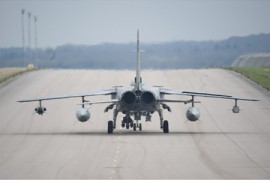
If the first question to ask about the current UN action in North Africa is, why Libya, then the second question is why Britain. If yesterday’s blog entry is correct and there might be a case for action (although note the caveats as well as the main argument), then why does it fall to the United Kingdom to take that action? By my map, the UK is 1350 miles from Libya, and there are perhaps 70 countries that are closer. So why us?
The argument outlined yesterday, that there are people who need to be protected from a dangerous and despotic government, does not necessarily lead to an obligation to act. As Rory Stewart put it in the House of Commons in the debate on 21 March 2011:
“We do not have a moral obligation to do what we cannot do. We have to consider our resources rather than our desires.”
And our resources are declining. The Strategic Defence and Security Review conducted in a hurry by the coalition government last autumn, is reducing the UK’s military capacity considerably. Pilots and soldiers are being made redundant, whole fleets of aircraft are being scrapped, there will be aircraft carriers with no planes to fly off them. Norman Tebbit called this a pub with no beer.
Britain could have declared itself unable to act, enthusiastic except for the point when commitment is finally needed. But that would bring into doubt the seat on the UN Security Council. A permanent seat and a veto on the UNSC bring with them duties as well as rights. The expectation was that the five permanent members, because they had the most power and the biggest stake in the status quo, would take a lead in enforcing the decisions of the UNSC as well as in taking them. To do the talking but not the fighting would upset this arrangement and fuel the opinion that the UK was no longer worthy of a seat.
This website is of the view that the UK should give up its seat anyway, so are there any other reasons why Britain should act?
The crucial argument is that, UN seat or not, a policy is doomed to failure if its supporters will only talk about it and not implement it. In the absence of a dedicated and autonomous UN military capacity (something else Federal Union has called for in the past), military contributions from its member states will be called upon. Even a country with declining military capacity like Britain can still contribute something.
The reason why it falls to Britain to act is a familiar one: that there are benefits to be had from collective action that cannot be achieved by the sum of individual actions on their own. This principle is why government exists at all, and the absence of anything resembling government at the international level is keenly felt.
Britain cannot do everything, but it can do something. And if the collection of those somethings from the different member states amount to sufficient to achieve the objectives set, then it can be appropriate to act.
